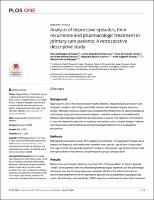Por favor, use este identificador para citar o enlazar este ítem:
https://repositorio.usj.es/handle/123456789/514
Registro completo de metadatos
| Campo DC | Valor | Lengua/Idioma |
|---|---|---|
| dc.contributor.author | Nuggerud-Galeas, Shysset | - |
| dc.contributor.author | Sáez-Benito, Loreto | - |
| dc.contributor.author | Berenguer, Nuria | - |
| dc.contributor.author | Suescún, Ana Victoria | - |
| dc.contributor.author | Aguilar-Latorre, Alejandra | - |
| dc.contributor.author | Magallon-Botaya, Rosa | - |
| dc.contributor.author | Oliván-Blázquez, Bárbara | - |
| dc.date.accessioned | 2021-03-02T13:02:08Z | - |
| dc.date.available | 2021-03-02T13:02:08Z | - |
| dc.date.issued | 2020-05-21 | - |
| dc.identifier.citation | Nuggerud-Galeas S, Sa´ez-Benito Suescun L, Berenguer Torrijo N, Sa´ez-Benito Suescun A, Aguilar-Latorre A, Magallo´n Botaya R, et al. (2020) Analysis of depressive episodes, their recurrence and pharmacologic treatment in primary care patients: A retrospective descriptive study. PLoS ONE 15(5): e0233454. https://doi.org/10.1371/ journal.pone.0233454 | es_ES |
| dc.identifier.issn | 1932-6203 | es_ES |
| dc.identifier.uri | https://repositorio.usj.es/handle/123456789/514 | - |
| dc.description.abstract | Background Depression is one of the most prevalent health problems, frequently being a medium- and long-term condition, with a high comorbidity rate and with frequent relapses and recurrences. Although numerous studies have compared the effectiveness of specific antidepressant therapy drugs and have assessed relapses, scientific evidence on the relationship between pharmacologic treatments and recurrence is scarce. The objective of this study is to describe depressive episodes in a primary care patient cohort, the percentage of depression recurrences and the administered pharmacologic treatment, from a naturalistic perspective. Methods Retrospective descriptive study. 957 subjects were included. The dependent variable was a depression diagnosis and independent variables were: gender, age at time of data collection; age of onset, first-episode treatment, number of recurrences, age at recurrences, treatment prescribed for recurrences using therapeutic groups categorization. Results Recurrences are frequent, affecting more than 40% of the population. In the first episode, 13.69% of the patients were not prescribed pharmacological treatment, but this percentage decreased over the following depression episodes. 80.9% of the patients who did not receive drug treatment in the first depression episode did not experience subsequent episodes. Monotherapy, and specifically, SSRIs were the most frequently prescribed treatment option for all depressive episodes. Regards the combined pharmacologic treatment, the most frequent drug combinations were SSRIs and benzodiazepines.Limitations In order to increase the power of results, the statistical analysis was performed using therapeutic groups categorization, not individually analyzing each drug and dose. Conclusions Depressive episode recurrence is frequent in primary care patients. Further studies having a prospective design are needed in order to expand on this issue. | es_ES |
| dc.format.extent | 15 p. | es_ES |
| dc.format.mimetype | application/pdf | es_ES |
| dc.language.iso | eng | es_ES |
| dc.publisher | PUBLIC LIBRARY SCIENCE | es_ES |
| dc.rights | Atribución 4.0 Internacional | * |
| dc.rights.uri | http://creativecommons.org/licenses/by/4.0/ | * |
| dc.title | Analysis of depressive episodes, their recurrence and pharmacologic treatment in primary care patients: A retrospective descriptive study | es_ES |
| dc.type | journal article | es_ES |
| dc.identifier.doi | 10.1371/journal.pone.0233454 | es_ES |
| dc.rights.accessRights | open access | es_ES |
| Aparece en las colecciones: | Artículos de revistas | |
Ficheros en este ítem:
| Fichero | Descripción | Tamaño | Formato | |
|---|---|---|---|---|
| Analysis of depressive episodes, their recurrence and pharmacologic treatment in primary care patients.pdf | 705,67 kB | Adobe PDF |  Visualizar/Abrir |
Este ítem está sujeto a una licencia Creative Commons Licencia Creative Commons

